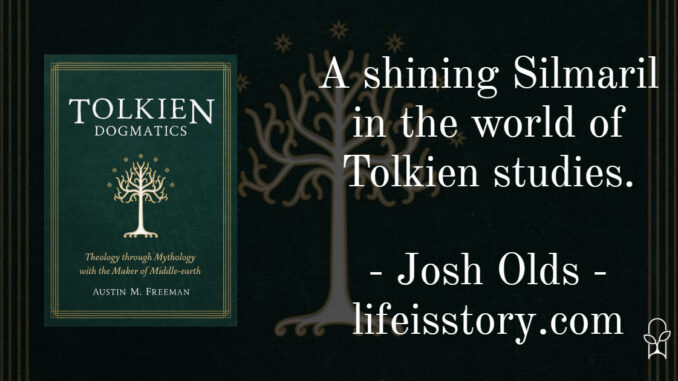
Published by Lexham Press on November 16, 2022
Genres: Academic, Non-Fiction, Theology, Writing
Buy on Amazon
Goodreads

J. R. R. Tolkien was many things: English Catholic, father and husband, survivor of two world wars, Oxford professor, and author. But he was also a theologian. Tolkien’s writings exhibit a coherent theology of God and his works, but Tolkien did not present his views with systematic arguments. Rather, he expressed theology through story.
In Tolkien Dogmatics, Austin M. Freeman inspects Tolkien’s entire corpus―The Hobbit, The Lord of the Rings, and beyond―as a window into his theology. In his stories, lectures, and letters, Tolkien creatively and carefully engaged with his Christian faith. Tolkien Dogmatics is a comprehensive manual of Tolkien’s theological thought arranged in traditional systematic theology categories, with sections on God, revelation, creation, evil, Christ and salvation, the church, and last things. Through Tolkien’s imagination, we reencounter our faith.
I worked my way into the world of Tolkien backwards from how you might expect. It was the Peter Jackson movies, not the books, that first grabbed my attention and introduced me to this vast fantasy world. It turns out I was not alone and since the release of those films twenty-some years ago, the words and worlds of Tolkien have enjoyed quite a resurgence. For the past few years, I’ve made it a habit to read or listen to The Lord of the Rings in its entirety. Read one year, listen the next, watch the year after. And in the latter half of 2023, I began to collect the wider writings of Tolkien with the goal of spending 2024 immersed in the complete oeuvre of one of history’s most accomplished fantasy authors.
For every book that Tolkien wrote, dozens have been written about Tolkien—his writing, his friendships, his methodology, his philology, his theology, and more. Tolkien Dogmatics is a comprehensive exploration of Christian theology as seen through the lens of the mythology of Middle-Earth. I came into it expecting a more relaxed read. I had read other books on elements of faith in Tolkien’s works—Ralph Wood’s The Gospel According to Tolkien the most notable—and found them to be for fans of the books or movies who wanted to relate the stories to their faith. Tolkien Dogmatics is the opposite. It’s intended audience is for fans of theology who want to relate their theological thinking to the world of Middle-Earth. The distinction is important. This is a theologically rigorous work.
The author, Austin M. Freeman, holds a Ph.D. in Systematic Theology and has written extensively on the intersection of fantasy and theology, including articles in official Tolkien studies journals. His passion for both Tolkien and theology exudes off every page of Tolkien Dogmatics. What impressed me the most was his thoroughness. Most books that I’ve read referencing Tolkien’s theology stick to The Lord of the Rings and The Hobbit, perhaps quoting from one of the more popular of Tolkien’s letters. Freeman quotes from The History of Middle-Earth, a Tolkien super-fan only exploration—really, what one might call a literary archaeology—of the development of Middle-Earth as edited by Tolkien’s son, Christopher based on Tolkien’s extensive unpublished writing. The Silmarillion also features heavily (and how could it not?), and even non-Middle Earth writings get their due.
Even as a Tolkien fan, it took me several months to really sit down and process this book because I felt like I kept needing to go back to the source material. Tolkien Dogmatics is a systematic theology and commentary of Tolkien’s corpus of writings. If you absolutely adore Tolkien (or systematic theology!) and want a comprehensive look at how Christian (and particularly, Catholic) theology permeates his work, this is your textbook. If you are a more casual reader—of either Tolkien or theology—I would suggest beginning with Ralph Wood’s The Gospel According to Tolkien and then decide whether or not to tackle this more daunting work.
Tolkien Dogmatics is constructed like a systematic theology: It begins with a prolegomenon and has twelve chapters on 1) God, 2) Revelation, 3) Creation, 4) Humanity, 5) Angels, 6) The Fall, 7) Evil and Sin, 8) Satan and Demons, 9) Christ and Salvation, 10) The Church, 11) Christian Life, and 12) Last Things. Each chapter is approximately 20-30 pages long and does a good job of covering both an overview of orthodox Christian teaching and how Tolkien relates that to his mythos. Freeman also does well in retaining a sense of Tolkien’s (and thus Middle-Earth’s) Catholicity even as he writes as a Protestant who teaches at a Baptist university. There were times that I felt the connection between the theological concept and the nearest Tolkien analogue was tenuous at best. That is to say, Tolkien Dogmatics occasionally struggles to make the case that when Tolkien wrote about a certain mythological element, he was building on a certain theological element. Tolkien would prefer it that way, I think. He was not intending to create a theological analogue in his fiction.
In short, I think I am safe in calling Tolkien Dogmatics the theological textbook of Middle-Earth. This work is very niche, a passion project meant for a specific audience. I see value in it for the theologically-minded to see how what Tolkien would term “sub-creation” retains theological truths. I see value in it for fantasy writers seeking to build better fictional worlds. I see value in it for the Tolkien scholar wanting to better understand Tolkien’s faith. It’s so much more than I expected when I began. Tolkien Dogmatics is a shining Silmaril in the world of Tolkien studies.
